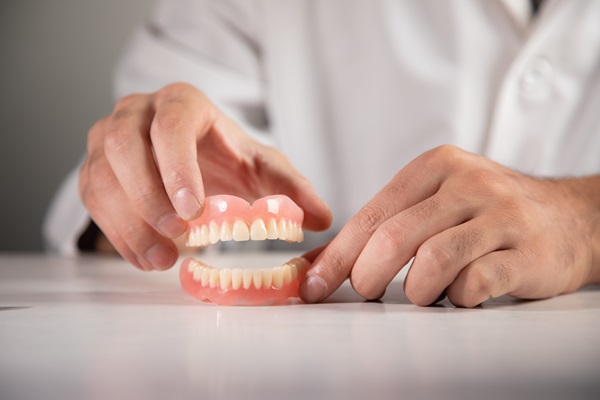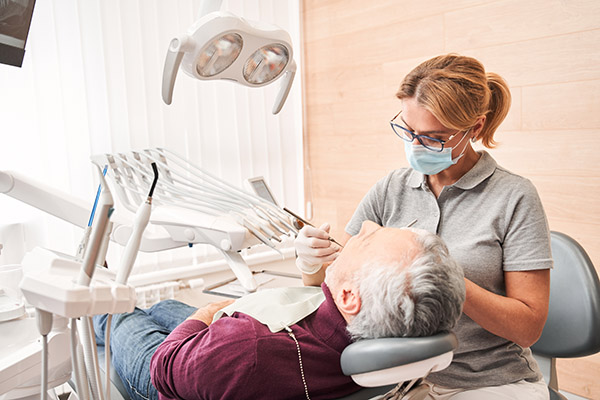Are Dentures Only For Older Patients?

Sometimes it is necessary for young people to get dentures to replace most or all of their teeth. While many people regard denture-wearing as something that occurs as people get older, tooth loss can happen at any age.
If you are missing your natural teeth, dentures can give you back your smile. They do more than help restore your natural appearance, though. They support facial muscles that otherwise sag without teeth in place, making you look older. Dentures also make it easier to speak and, of course, to eat.
How do young people lose their teeth?
If you are young and need dentures, you are not alone. Among the most common causes of tooth loss are poor oral hygiene habits and lack of professional dental care in childhood. These factors can lead to gum disease and tooth decay. However, there are other reasons young people lose teeth:
- Injuries to the mouth or teeth, such as a sports injury or car accident
- Gastrointestinal reflux: a condition that causes stomach acid to enter the mouth and erode teeth
- Hypodontia: a condition in which teeth do not develop
- Ectodermal dysplasia: a genetic disorder that can cause teeth to form abnormally
- Papillion-Lefèvre syndrome: a rare condition that causes degeneration of the structures that support the teeth
- Hypophosphatasia: a genetic disorder that causes impaired mineralization in bones and teeth
No matter what the underlying cause, unexpected tooth loss should be treated as soon as possible to prevent complications, especially in younger children. Traditional dentures had their disadvantages in the past, but modern advances in dentistry have led to significant improvements. For example, many people have found that dentures have a tendency to slip around or fall out of the mouth, especially when eating. In young adults, implant-supported dentures that snap into place are attached to small metal rods, eliminating the concern of a loose fit.
Even without the use of this type of appliance, dentists are able to use modern technology to design dentures that have much better size, shape, and fit for each unique mouth. Proper home care and routine adjustments help ensure that the patient is comfortable and that the appliances are secure for daily use.
What are the benefits of dentures at a young age?
If necessary, children can start wearing dentures in preschool. It may seem early, but children with premature tooth loss can benefit from them. Some of the ways dentures help young people include the following.
Improved speech
At a critical time when children are developing language skills, dentures can help them communicate more effectively. Even synthetic teeth can provide the structures needed to properly form sounds and words, resulting in better speech for improved communication skills.
Better nutrition
Young people need a healthy diet. Digestion begins in the mouth with chewing, and dentures can make it possible to eat raw fruits, vegetables, nuts, and other healthy foods required for growth. They also make chewing more efficient, which can lead to better nutrient absorption and improved digestion.
Improved jaw and tissue development
Dentures can help support the mouth structure as children grow. Implant-supported dentures can also prevent jaw bone loss long-term.
Psychological well-being
Children and teens naturally want to fit in and look like their peers. Dentures can give them a smile to be proud of, increasing their self-confidence. Studies have shown that there are numerous benefits to smiling more often, from lower stress levels and healthy blood pressure levels to an improved mood and a boosted immune system. Dentures can help patients of all ages smile more often, enjoying all the physical and mental health benefits that come with it.
Age-appropriate appearance
Tooth loss causes jaws to overclose and cheeks to sink in, making a young person look older. Dentures support facial structure and help create a regular appearance for the age of the wearer.
Conclusion
If you feel like you are too young for dentures, keep in mind that many other children, teenagers, and young adults wear them, too. You can have dentures that look like your natural teeth, giving you a beautiful smile. They can also enhance growth and speech development by helping you eat healthy foods, support your jaw structure, and use proper speech patterns. There is a learning curve when you get dentures, and it may take some time to get used to them. However, you will look and feel great about your oral health — and, of course, your smile.
Request an appointment here: https://drdavidbrumbaugh.com or call R. David Brumbaugh, DDS at (214) 306-4402 for an appointment in our Dallas office.
Check out what others are saying about our dental services on Yelp: Dentures and Partial Dentures in Dallas, TX.
Related Posts
If you have lost multiple teeth, it is important to find a safe and comfortable way to replace them to maintain your oral health and overall quality of life. Implant overdentures offer a strong and reliable alternative to regular dentures. They provide better support and increased comfort, making you feel more confident during everyday activities.Implant…
Many people see tooth replacement as something they can postpone without serious issues. However, putting off tooth replacement can lead to more problems than leaving a gap in your smile. Missing teeth can cause various oral and health problems, creating financial, functional, and emotional stress that you can otherwise avoid with immediate treatment.When a tooth…
Wondering whether your general dentist can provide cosmetic dentistry services? Read on to learn more. Even though some might consider cosmetic dental procedures unnecessary, many people are concerned about their appearance and desire aesthetic appeal. A general dentist can offer that improvement. Cosmetic dentistry has helped many people over time to enhance the appearance of…
Getting a dental checkup is often one of the most critical ways of keeping your smile in great condition. One thing the appointment involves is looking for cavities. Finding them early allows you to get the right treatment. That way, these are less likely to become worse issues. Keep reading to learn more about the…


